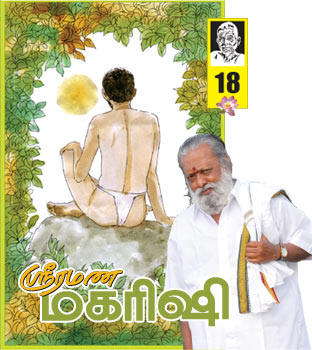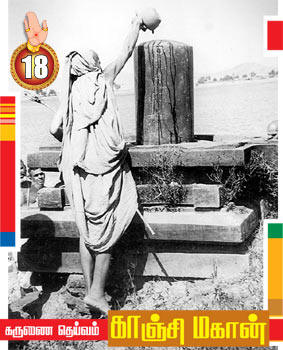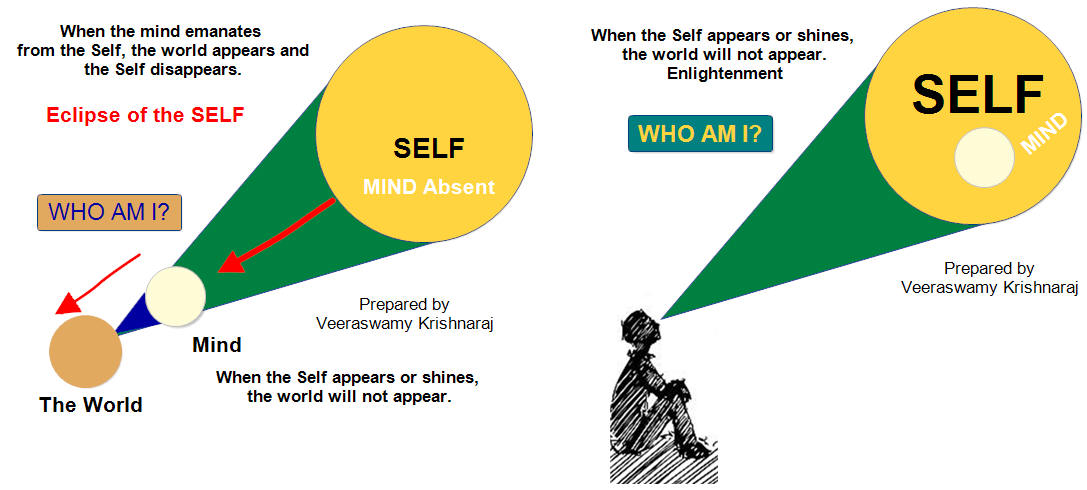2010-12-14-part1-2
![]()
Maṉam or mind is the wonderful product of Ātmā. The mind generates thoughts. There are many layers of thinking and perception: He is good; he is bad; this is right, that is wrong; this is lofty, that is crafty. If you remove these thoughts, mind as an entity does not exist. Mind is multiple layers of thoughts.
Those thoughts are your creations. You look at the world through the prism of thoughts. Deep sleep has no thoughts. Therefore, there is no world. As the spider extrudes silk (to make a web), you create the world by your thoughts. The spider makes and eats the silk. Likewise, you withdraw the thoughts into yourself. You think, ‘This is the world.’ You separate people into the good and the bad. This process multiplies and magnifies. The world loses its natural state in your perspective and becomes the world of your creation. What you regard as evil, another determines as good and vice versa.
Every man creates a world of his own, fails to see the real world, and undergoes suffering. The Jñāni who involuted his mind can see the reality of the world as the real.
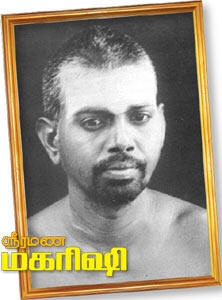
Every
man creates a world of his own, fails to see the real world, and
undergoes suffering. The Jñāni who involuted his mind can see the
reality of the world as the real.
Where are these remembrances? Where is this ‘I?’ The mind is where the
‘I’ is. That ‘I’ comes from the heart. That subtle spiritual heart is
not made of flesh, a fingertip to the right side of the pit of the chest
(xiphisternum). That is where the ‘I-thought’ resides. “I” is the mind.
See diagram. If there is no “I” there is no mind. Only after the I-ness
appears, other thoughts arise:
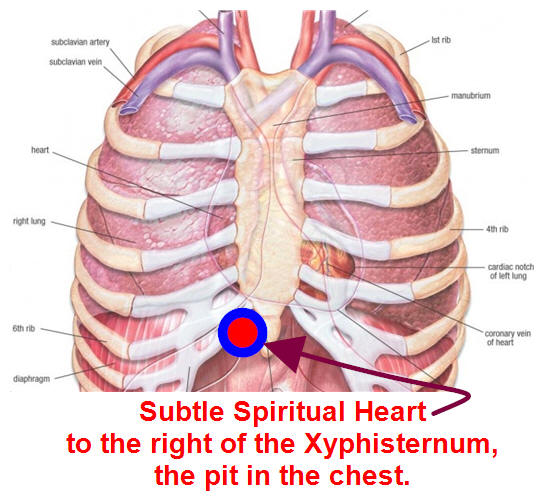
‘After the I-Thought (First person) only, other thoughts appear: Muṉṉilai (= Second person) and Paṭarkkai (= Third person). Without the first person, there is no second or third person.
In “Who am I” inquiry, the mind dies. The mind looks intently to the mind (itself), questions, “Who are you?” makes an enquiry and dies along with the “I.”
The
staff (the stick) used to turn the burning dead body in a pyre is cast
off in the fire after completing the burning of the body. Likewise, the
enquiring mind, like the staff, disappears. Not following the lead of
the thought streams, not thinking of transforming thoughts into deeds,
not analyzing the consequences of one’s thoughts and not enquiring into
who originates these thoughts, the mind comes back to its beginning and
resting state. That thought vanishes. With constant practice, the mind’s
power to involute in the place of origin increases. The wonder is the
place where there is no “I” even in a minute amount. (This is where the
thoughts come to die.) That is Silence. That itself is Jñāṉadṛiṣti
(Spiritual perception, occult vision). That is the seat of Truth. That
is Āṉma Sorūpam (Nature of soul). All else are the imaginations of the
mind.
To curb the mind, besides “Who am I?” inquiry, there is no another way.
Observing other modalities, the mind’s tranquility of short duration
takes place only to rise again.
Pranayama curbs the mind. It is true. The benefits last if the breath is
controlled (for the duration of breath control); from thereon, the mind
runs helter-skelter. Mind and breath have a common origin. Where ego
takes its origin, that being also the origin of “I” is the origin of
breath.
During deep sleep, the mind is tranquil; the breathing is active. During
Deep Sleep, not mistaken for death by nature’s grace and mercy, only the
breath moves. In the mind, the gross form is breath or Prāṉa. Until the
moment of death, the mind keeps the breath in the body. At death, the
mind leaves with breath in its grasp. Prāṇāyāma, though not knowing how
to curb the mind, will not break the mind.
Dhyanam and Mantra Japam are ways to curb the mind. The elephant’s
proboscis is in constant motion. If a chain is given to the restless
trunk, the elephant will hold on to the chain. Likewise, if the chain of
Mantra Japam is given to the mind compared to the elephant, it holds on
to it. When the Mantra Japam slips, the mind will become restless. But,
Mantra Japam facilitates the concentration of the mind. The mind, primed
with Mantra Japam, is immersed in “Who am I?” inquiry. The mind can be
destroyed.
Food in lesser amounts helps augment a tranquil mind, gives mental
strength, and takes you on the path of Āṉma Visāram (Soul Enquiry).
Spicy foods and overindulgence make the body drowsy, giving dream sleep.
Āṉma Visāram is beyond reach. Āṉma Visāram is responsible for the
destruction of the mind (It is NOT Brain Death!). All of these are
auxiliary factors. The inquiry, “Who Am I?” only destroys the mind. When
thoughts arise, intense attention should be given. To whom it arises
should be considered. When the thought is enquired into, the mind gives
up the thought and stands empty-handed.
As the enemies come out of the fort, they are killed. Likewise, any
thoughts coming from the mind should be destroyed. Then, the clarity of
“Who am I?” becomes well-known.
Guru controls his mind and destroys his thoughts. God and Guru are the
same. The meat in the tiger’s mouth is irrecoverable. Likewise, those
who come under the Guru’s gracious visage will be rescued. Hold on to
the Guru and follow his path of thought destruction.
There is no happiness in any affairs of the world. Happiness is to know
Ātma. It is receiving the vision of the Sorūpam (God). Why do objects
appear to give happiness? When the objects are experienced and enjoyed,
the mind gets the vision of the Ātma and comes out. During the vision,
there is happiness. The mind receives Ātma Darśan when water satisfies
the thirst, food relieves hunger, a tree gives shade from the sun, and
sexual intercourse gives pleasure. For a brief time, in these matters,
the mind receives Ātma Darśan. The mind feels, “Oh, what a pleasure and
relief!” Forgetting, and leaving that happiness, the mind goes in search
of the next pleasurable experience. There is no happiness in these
earthly pleasures. Happiness is realizing Ātma; the wise ones having
found it, shed the everyday joys, remove them from their lives, and
continuously endeavor to obtain Ātma Darśan (God-Realization).
All religions describe the destruction of the mind and abandoning the
trivial pleasures of the mundane world in so many other ways. Knowing
this, what purpose does it serve to continue reading the (self-help or
spiritual) books? To destroy the mind, we should enquire into, “Who am
I?” Enquiring into the mind, immersing in the Soul is ‘Soul Enquiry.’
There is no gain in engaging in discussions of academic knowledge of
Tattvas without an inquiry. Tattvic talks make the mind a garbage dump.
With a mind in ablation, however sinful is the interlocutor, hatred of
him will not appear in your mind. However much he causes grief,
oppositional endeavor (on your part) will not appear. The thought that
the injured one is not ‘I,’ will reign high. The world will fear such a
person.
The mind should not dwell on other matters; one should not poke his nose
in another’s business. It is lofty to give others what is yours. What
you give others is what you give yourself. Who will not give to others?
Humility breeds virtue. When the mind is subdued, living anywhere is
possible.
These are ideas of Ramana, written in a book form by Śivapprakāsam
Pillai. It is for people like us. Ramana’s path is not easy, as we are
shaped by different educational systems and habits which let the mind
wander in many directions. There is a chance to understand Ramana’s
tenets when we cling to the worldly matters and suffer because of them.
Enquiring into, ‘Why all these miseries,’ will take us near the premise,
“Who am I?” If you continue the effort and remain embedded in the
inquiry, there is a great opportunity for subduing of the mind. When we
engage in the white noise of success and failure, wishing well and ill,
we get enmeshed in imaginations (of the phenomenal world) and languish
unable to get out (of the world of mundane thoughts).
Endeavor and enthusiasm to search for the truth are not the forte of
all. With fervor rising, endeavor asserting in you, there is always
Bhagavan Ramanar to show the path.
Let us get Darśan.
Images: K.Rajasekaran.
Sakti Vikatan 2010-12-14- part2Guru Darśan = Vision of Guru
Near Mēttūr,
a village Nerunjippettai. 1928. Periyava made a visit.
The village personage Sundara Reddiar and the then M.L.A Gurumurthy had
devotion, love and respect for Periyava. They used to go to Periyava, the
divine man from their village, with other villagers to pay homage to
him. They were happy to receive Periyava.
There rang a chorus, ‘Jaya Jaya Sankara; Hara Hara Sankara.’ The people
sat around Periyava. There
was another chorus coming from some distance: ‘Govinda Govinda.’ That
chanting caught the attention of Periyava and he asked where it was coming
from.
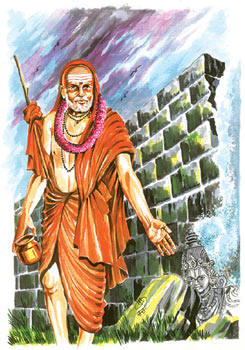 “Nearby,
a mountain by name Bālamalai…
At the top, there is a Srisiddhēṣvarar
Temple (Śiva-Liṅgam).
The devotees going up the mountain utter the name of Govinda. It is
about 12 KM from here,” the village elder told Periyava.
“Nearby,
a mountain by name Bālamalai…
At the top, there is a Srisiddhēṣvarar
Temple (Śiva-Liṅgam).
The devotees going up the mountain utter the name of Govinda. It is
about 12 KM from here,” the village elder told Periyava.
To Mahāperiyava, it gave a great delight. Wondering about the devotees’
chanting of Govinda to pay homage to Īśvara (Siva), he expressed his
desire to see and pay homage to Srisiddhēṣvarar.
The devotees were hesitant thinking a 12-mile hike up the mountain would
be difficult for Periyava.
But, Periyava was already on his way up the mountain.
Sundara Reddiar organized a team of devotees directing them to show the
way up the mountain to Periyava who in his grace showed the path of
virtue to his devotees.
Mahāperiyava having gone 12 miles up the mountain and paying homage to
Srisiddhēṣvarar declared, “One day in the future, one devotee at his own
expense will build a temple for this Swamy.” Mahāperiyava’s divine
prediction came true 62 years later in the 1990s.
That year…north Indian Setji came to receive Darśan of Srisiddhēṣvarar.
We don’t know the orders he received from Īśvara.
That devotee at his expense
built a temple and helped defray the cost of Kumbabishekam (Consecration).
Akilā
Karthikeyan narrated this story in a rapturous mood. He had another
interesting story to share with us.
“Long time ago, the ruling king in this part of the country wanted to
offer a gift to the people who paid their taxes fully and on time.”
He called his minister and ordered him, “dump the coins in water.” The
mind-reading minister ordered his servants to build two
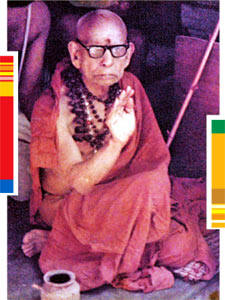 bunds (dams). Because of it, the land was prosperous.
bunds (dams). Because of it, the land was prosperous.
When Periyava stayed in Nerunjippettai, the water flowed between the two
bunds making a great sound like water rolling the rocks. Periyava
finding an idol of Perumal among the rocks asked the village elders
whether they knew anything about it.
They said, "We heard the story of a king donating six acres of land for
Veṅkaṭa Perumal Temple. We know only that much." Periyava observed,
there is a treasure trove below, pointing to a spot nearby.
The villagers did not understand why Periyava made such an
observation earlier.
Many years later, the Government built the Mettur Dam for power
generation. When the engineers dug a hole in the ground, they found and
removed the idol. They went further down to a depth of 25 feet, prepared
to lay the foundation, and found a treasure trove. Then only the
villagers understood the prophesy of Periyava.
First Hanuman idol was discovered and later the engineers found Srīrāma
and Sītadēvi
idols. Horripilated Reddiar and other villager transported the idols to
Kanchipuram. They met with Mahāperiyava and narrated the matter to him
and requested him to build a temple for the idols.
Mahāperiyava assented to their proposal, offered his blessings
and grace and said, “Do it forthwith. This will proceed fast.”
When they were about to leave, Periyava called them back inside and
addressed them, “When I went up the mountain to pay homage and receive
Darśan of Sri Siddheśvar, I had Perumal Gavundar as my guide. Is he
well?” Periyava remembered his
humble guide 70 years later. With love and concern, he made an enquiry
of him. They were horripilated hearing this from Periyava.
The devotees answered, “Gavundar is doing well. He is 95 years of age.
Periyava pointed to the metal
plate with the new clothes said with love, “Take this plate with the
clothes to Perumal Gavunder and tell him I enquired of him very much.”
Perumal Gavundar must have good fortune to be remembered by and receive
gifts from Periyava. They all melted in the shower of love and blessings
of Periyava to long lost guide. He never forgot his guide over a period
of decades. He had the love and respect for him. That is the mercy of
Periyava.
